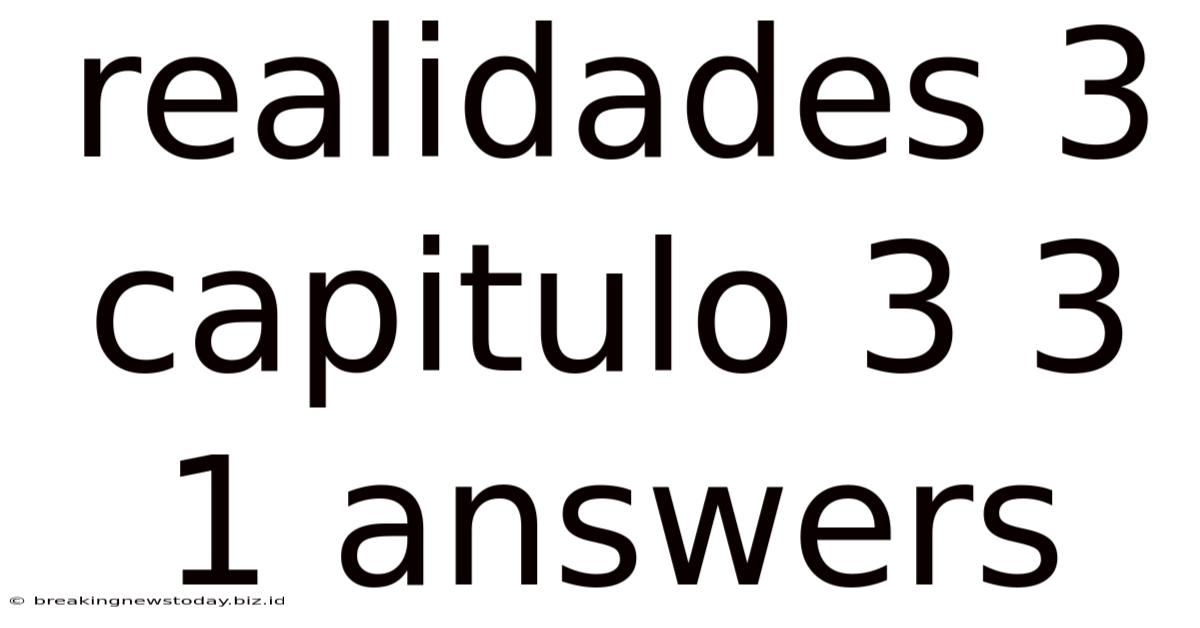Realidades 3 Capitulo 3 3 1 Answers
Breaking News Today
May 12, 2025 · 4 min read

Table of Contents
Realidades 3 Capítulo 3, 3.1 Answers: A Comprehensive Guide
This comprehensive guide provides answers and explanations for the activities in Realidades 3, Chapter 3, Section 3.1. We'll cover key vocabulary, grammar concepts, and provide insights to help you understand the material thoroughly. Remember that while these answers can be helpful, actively engaging with the textbook and attempting the exercises independently is crucial for true comprehension and learning.
Understanding the Context: Capítulo 3, Sección 3.1
Before diving into the answers, let's establish the context. Chapter 3 of Realidades 3 likely focuses on a specific theme, perhaps related to travel, culture, or a particular aspect of Spanish-speaking society. Section 3.1 introduces foundational vocabulary and grammar related to this theme. This section likely builds a strong base for understanding the more complex activities in subsequent sections.
Key Vocabulary and Grammar Concepts (Likely Covered in 3.1)
This section will vary depending on the specific edition and curriculum of Realidades 3. However, common grammatical concepts and vocabulary within Chapter 3, potentially covered in 3.1, might include:
-
Imperfect Tense (Preterite vs. Imperfect): A critical component of Spanish grammar, contrasting the preterite (completed actions) and imperfect tenses (ongoing or habitual actions) is essential for describing past events accurately. Understanding the nuances of when to use each is crucial.
-
Descriptive Adjectives: Accurately describing people, places, and things is crucial. This section may focus on the placement and agreement of adjectives in Spanish sentences.
-
Travel Vocabulary: Words and phrases related to travel, transportation, accommodations, and sightseeing are likely introduced. This might include verbs like viajar, llegar, ir, and nouns like avión, hotel, museo.
-
Cultural Expressions: Learning cultural expressions is vital for understanding the nuances of the language. This could involve common phrases, idioms, or colloquialisms related to the chapter's theme.
-
Direct and Indirect Object Pronouns: Mastering the use of direct and indirect object pronouns is key to constructing more complex and grammatically correct sentences. This section may provide practice in using these pronouns correctly.
Sample Activities and Answers (Hypothetical Examples)
Since I don't have access to the specific content of your textbook, I will provide examples of the types of activities you might encounter in 3.1 and illustrate how to approach them. Remember to replace these examples with the actual questions from your book.
Example 1: Vocabulary Matching
(Textbook): Match the following words with their definitions:
- Llegar a. to visit
- Visitar b. to arrive
- Avión c. hotel
- Hotel d. airplane
(Answer):
- Llegar - b. to arrive
- Visitar - a. to visit
- Avión - d. airplane
- Hotel - c. hotel
Example 2: Sentence Completion (Imperfect Tense)
(Textbook): Complete the following sentences using the imperfect tense of the verb in parentheses.
- Ella ____ (vivir) en Madrid cuando era niña.
- Nosotros ____ (viajar) mucho durante las vacaciones.
(Answer):
- Ella vivía en Madrid cuando era niña. (She lived in Madrid when she was a child.)
- Nosotros viajábamos mucho durante las vacaciones. (We traveled a lot during the vacations.)
Example 3: Sentence Writing (using Direct and Indirect Object Pronouns)
(Textbook): Write sentences using the following prompts:
- (Yo/comprar/un regalo/a mi madre)
- (Ella/escribir/una carta/a su abuela)
(Answer):
- Yo le compré un regalo a mi madre. (I bought a gift for my mother.)
- Ella le escribió una carta a su abuela. (She wrote a letter to her grandmother.)
Example 4: Reading Comprehension
(Textbook): Read the following passage and answer the questions. (A short passage about a person's travel experience would be included here)
(Answer): This section would require detailed answers based on the provided passage. The answers should demonstrate a thorough understanding of the text. Make sure to support your answers with specific references from the passage.
Strategies for Success in Realidades 3
Here are some effective strategies to enhance your understanding and performance:
-
Active Reading: Don't just passively read the text. Actively engage with the material by highlighting key vocabulary, taking notes, and summarizing main ideas.
-
Vocabulary Building: Create flashcards or use online resources to memorize new vocabulary. Try using the words in sentences to reinforce your understanding.
-
Grammar Practice: Regularly practice the grammar concepts introduced in each section. Use online exercises or workbooks to supplement your textbook.
-
Seek Help When Needed: Don't hesitate to ask your teacher or classmates for help if you're struggling with any concepts.
-
Review Regularly: Regular review is essential for retaining information. Review the material from each section before moving on to the next.
-
Utilize Online Resources: Explore online resources, such as Spanish dictionaries, grammar guides, and interactive exercises, to enhance your learning experience.
Conclusion
This guide offers a framework for approaching the activities in Realidades 3, Capítulo 3, Sección 3.1. Remember that active engagement with the textbook, diligent practice, and seeking clarification when needed are key to mastering the material. While these hypothetical examples provide guidance, always refer to your specific textbook for the accurate questions and activities. Good luck with your studies!
Latest Posts
Latest Posts
-
The Allele For Black Noses In Wolves
May 12, 2025
-
Unit 2 Progress Check Mcq Ap Spanish
May 12, 2025
-
Correctly Complete These Sentences Using The Words Provided
May 12, 2025
-
Recycling In Terms Of Solid Waste Management Means
May 12, 2025
-
Excel Associate 2019 Simulation Practice Test 1
May 12, 2025
Related Post
Thank you for visiting our website which covers about Realidades 3 Capitulo 3 3 1 Answers . We hope the information provided has been useful to you. Feel free to contact us if you have any questions or need further assistance. See you next time and don't miss to bookmark.